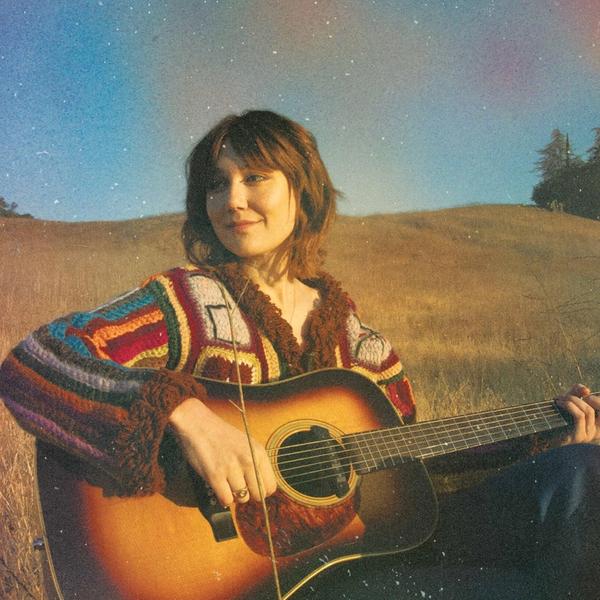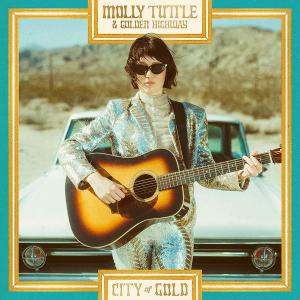




Link copied

To those who have watched her rapid ascent to the top ranks of Americana’s elite, Molly Tuttle could be considered something of a phenomenon. Since initiating her solo career just over four years ago, she’s released three critically acclaimed albums, an EP with fiddler John Mailander, two recordings with her family band and a pair of offerings with her college-formed group The Goodbye Girls, all in addition to performing in The First Ladies of Bluegrass alongside Alison Brown, Missy Raines and Sierra Hull.
It’s enough to make one wonder — how does she find the motivation and inspiration to bring her frenzied activity to fruition?
Of course, part of the answer lies in the downtime she experienced due to the pandemic, allowing her plenty of time to explore her muse. In truth, however, Tuttle’s proficiency has never been a problem. Raised in a musical family, she was taught the basics of bluegrass by her dad, with whom she recorded the album The Old Apple Tree at the age of 13.
An appearance on the popular Stateside radio program A Prairie Home Companion, a scholarship to the Berklee College of Music and a series of awards and accolades — including being the first woman to win International Bluegrass Music Association’s Guitar Player of the Year — made her a household name in the genre.
Her new album, Crooked Tree - recorded alongside her aptly named outfit Golden Highway - finds Tuttle returning to her bluegrass roots while also taking a significant step forward. Holler recently had the opportunity to speak with Tuttle about her decision to merge her past with her present.
This album seems to hold special significance for you from a very personal perspective. Several songs — ‘Flatland Girl’, ‘Big Backyard’, ‘Nashville Mess Around’, ‘San Francisco Blues’ and ‘Goodbye Girl’ in particular — appear to be autobiographical in nature. Are we reading that right?
They really are. About a year ago, I drove up to Illinois to visit the farm where my dad grew up. My grandfather played the banjo and he got our family tradition started - my dad grew up on the farm and he and my grandfather played bluegrass together; my dad then taught me how to play. Afterwards, I drove back to Nashville and wrote the song ‘Flatland Girl’.
It must have been like looking through an old family album and transporting yourself back to an earlier time and place - you had an opportunity to revisit your roots in a very literal way.
Yeah, it was cool. I grew up in California, which isn't where people think of bluegrass as coming from, but my dad took me to a lot of festivals and shows around the state. Jerry Garcia was from the town where I grew up. David Grisman was out there in the Bay Area and Tony Rice lived there for a while as well. So the California bluegrass scene is a big part of the community I grew up in. I tried to take inspiration from those places and put it in some of my songs, so hopefully people can see the different aspects of who I am as a musician.
Being you were connected to music at such an early age, was your path forward, at least career-wise, decidedly determined - did you have any other choice than to pursue it?
Looking back, I remember thinking that I wanted to do music when I was about 15. But a few days ago, we played in Louisville, Kentucky, and performed the song ‘Eight More Miles to Louisville’. I remember playing that song in third grade for my classmates - it must have been kind of odd for an eight-year-old to play that particular song.
Obviously, you had a handle on it early on.
I do feel like I'd had this focus, even since as a really little kid. I just really loved the music - it did block out everything else. I realized, when all the shows got shut down in 2020, that I don't really know how to do anything else. I thought that maybe I ought to pick up a couple of other hobbies. I like playing with other people, and I like performing, but I had kind of gotten out of the habit of just practising around the house by myself. It's just not as much fun. I liked school and stuff, but I was never really that focused on my schoolwork. I was always super into music.
Clearly it served you well. You’ve been remarkably prolific over the course of the past 15 years, the last 10 in particular. Given that Crooked Tree is your third album since 2019, what accounts for this prowess of yours?
It feels like I'm just getting started! I did a cover record during the pandemic […But I’d Rather Be With You] and that felt like something I needed to do to keep making music and feel inspired. But what I really love to do is write.
I really got a chance to write a lot over the last couple of years because of the pandemic. I wrote this whole bluegrass album in the last year, and I also have a whole batch of other songs that I'm hoping to record soon, too. So, I think that having that time at home to focus on songwriting has helped a lot.
Can you give us some insight into your songwriting technique? Is it a process where you deliberately sit down and get an idea, and you pursue it from start to finish? Or do the ideas just come to you when they’re least expected?
It really comes in different ways. I might sit and brainstorm song titles or song ideas, things I want to write about. And then I’ll have a list that I can come back to later on. I especially did that for the Crooked Tree album. It was easier for me because I knew I wanted to make a bluegrass record, and there are only so many different types of songs you can have within those parameters.
I also knew there were different themes that I wanted to write about: the Grass Valley festivals that my dad took me to when I was growing up; my grandpa's farm. I wanted to write a feminist bluegrass anthem, which I feel like I did with ‘Side Saddle.’ I also wanted to write a murder ballad, but an updated version, that became ‘Dooley’s Farm.’ So I did have all these ideas, and that helped a lot to map this album out. I feel like I was saying everything I wanted to say in this style of music.
You achieved such remarkable success from a relatively young age. When you've had that kind of acclaim early on, do you feel like you have to measure up to your past achievements - that you’re almost competing with what you’ve done before?
I always look back at my past albums feeling like I want to do better, but I don't feel like I’m competing against what I've done before. I always have the feeling that the record that I'm working on at the moment is my favorite project. I hope that it will resonate with people more than the last thing I did. So yeah, I guess do feel that pressure in a way, but I've also become somewhat dissatisfied with the albums that I've done in the past. I guess they’re just like kind of a snapshot of where I was. But I'm always thinking, I can do better than that.
---
Molly Tuttle's new album with Golden Highway, Crooked Tree, is out now. Read our full review here.




